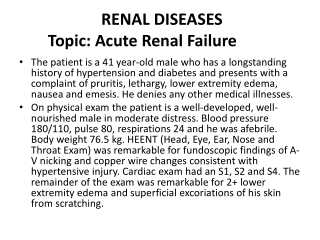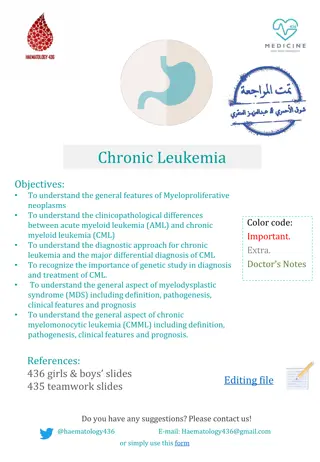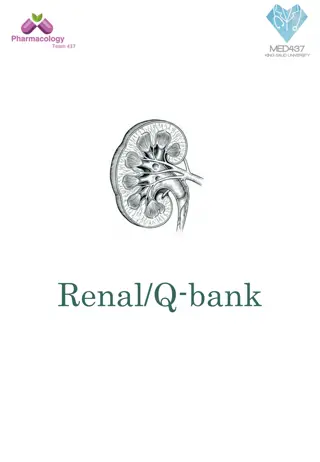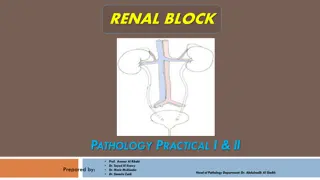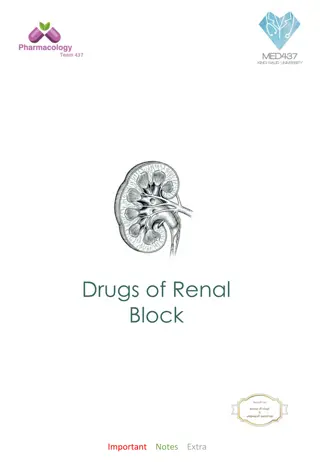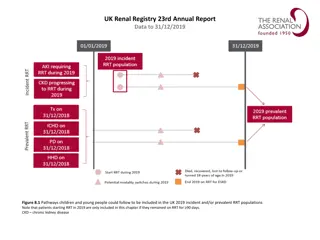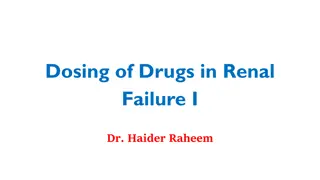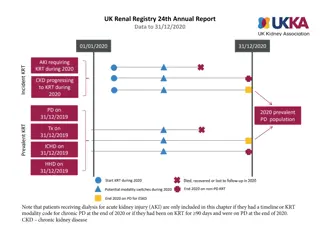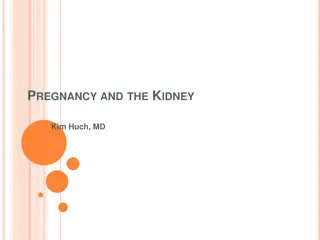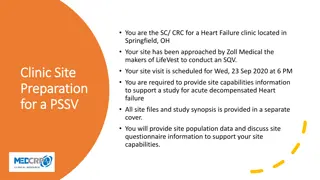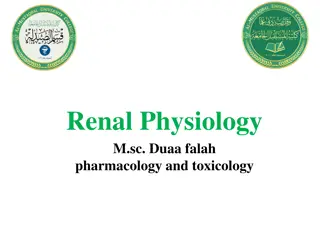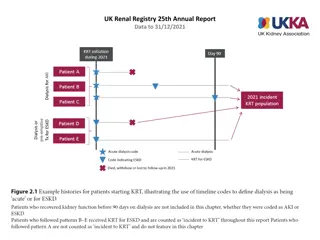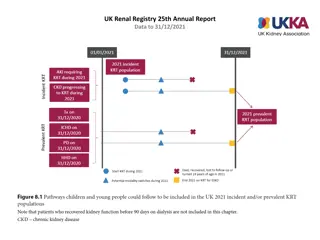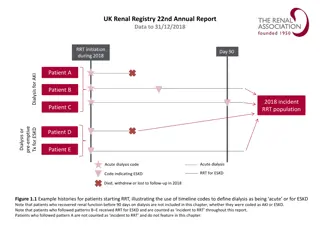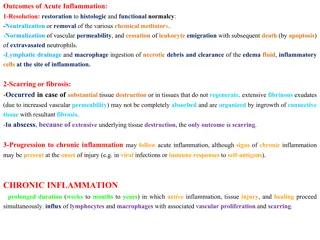Acute and Chronic Renal Failure
The kidneys play a vital role in the body, responsible for filtration of blood, regulation of blood volume and composition, production of hormones, and more. Acute renal failure is a sudden, reversible loss of kidney function, while chronic renal failure develops over time. Learn about the causes, clinical assessment, and distinctions between acute and chronic renal failure in this informative overview.
Download Presentation

Please find below an Image/Link to download the presentation.
The content on the website is provided AS IS for your information and personal use only. It may not be sold, licensed, or shared on other websites without obtaining consent from the author.If you encounter any issues during the download, it is possible that the publisher has removed the file from their server.
You are allowed to download the files provided on this website for personal or commercial use, subject to the condition that they are used lawfully. All files are the property of their respective owners.
The content on the website is provided AS IS for your information and personal use only. It may not be sold, licensed, or shared on other websites without obtaining consent from the author.
E N D
Presentation Transcript
Acute and chronic renal failure By Ahmed Esharawy Assistant Lecturer of medicine and cardiology Sohag University
Functions of the kidney Kidneys make up 1 % of body mass, but receive about 25% of cardiac output. Kidney has 3 major functions: 1. Filtration of blood Removes metabolic wastes from the body, esp. those containing nitrogen 3
2. Regulation: Blood volume and composition Electrolytes Blood pH and blood pressure 3. Production of hormones as erythropoitin 4
Definition Sudden and usually reversible loss of renal function, which develops over days or weeks. It usually accompanied by a reduction in urine volume.
Causes of Acute renal failure Pre-renal causes: 1- heart failure 2- blood or fluid loss as : Hemorrhage- diarrhea- burns 3- renal artery occlusion Pre-renal causes lead to kidney under-perfusion >> rapidly progressive changes>> acute tubular necrosis.
Causes, continued Intrinsic Renal causes 1- acute tubular necrosis Ischemic from prerenal causes. Bacterial toxins. Drugs as gentimicin. 2-Glomerular diseases Primary. Secondary : Systemic lupus. 3- interstitial diseases. analgesic nephropathy
Post- renal causes: -Stones - Tumors - Prostatic enlargment
Clinical assessment There may be marked hypotension with signs of poor peripheral perfusion as cold sweaty hands. Postural hypotension The cause of decreased renal perfusion may be obvious as hemmorhage or burnes . But in some cases, the cause may be concealed as GIT bleeding, fracture femur.
Uremic features as nausea, anorexia, and vomiting followed by drowsiness, confusion, muscle twitches, fits and coma. Tachypnea due to acidosis or pulmonary edema . Pulmonary edema from excessive fluid intake relative to urine output. Anemia due to blood loss, hemolysis and decreased erythropoietin production.
Alternation in Urine volume>>> patient is usually oliguric ( Urine volume < 500 ml\day), Anuria is rare and if present indicates post renal obstruction. Rise in Urea and creatinine. Disurbance in electrolytes, fluid and acid base balance 1- hyperkalemia 2- dilutional hyponatremia 3- metabolic acidosis 4- hypocalcemia
Managment Establish and correct cause of acute renal failure. If hypovolemia is present , restore blood volume as rapidely as possible ( with blood, plasma or isotonic saline). Monitoring of central venous pressure to assess the rate of fluid administration.
Correction of hyperkalemia ( serum K > 6mmol\L) by: 1- I.V calcium gluconate. 2-Inhaled B2 agonist as salbutamol. 3-I.V glucose and insulin 4-Ion- exchange 5- dialysis
Correction of metabolic acidosis 1- correction of blood volume will correct acidosis 2- Sodium Bicarbonate IV Dialysis in patients with pulmonary edema and anuria to remove excess fluids. Protien restriction to decrease urea and creatinine Control of infections.
Chronic Renal Failure
Definition Irreversible deterioration of renal function which develops over a period of years. Initially , it is manifest only as a biochemical abnormalities then loss of excretory, metabolic and endocrine functions of the kidney leads to the clinical symptoms and signs of renal failure>>> Uremia.
Aetiology Congenital and inherited Renal artery stenosis Hypertension Glomerular diseases Interstitial diseases Diabetes Mellitus Collagen vascular diseases Obstructive
Clinical manifestation May be discovered during routine investigation as raised blood level of urea and creatinine. The patient often has hypertension, anemia. Nocturia ( frequent micturation at night). Tiredness and dyspnea due to anemia. Anorexia, nausea, vomiting and GIT bleeding. Itching and hiccough. Muscle twitches, general bone pains. Parasthesia, numbness with reduced sensation due to neuropathy. Easy bruising and bleeding tendency.
Anaemia : Aetiology >>> Decrease erythropoitin production from kidney. Treatment>>>recombinant human erythropoitin. Fluid and electrolyte disturbnce: Leads to fluid retention , lower limb edema and episodic pulmonary edema. Treatment >>> decrease sodium intake - loop diuretics
Cardiovascular complications: -coronary artery disease ( angina and infarction) -pericardial effusion and constrictive pericarditis. -hypercholesterolemia. Treatment>>> control of hypertension- statin therapy to decrease hypercholesterolemia.
Metabolic bone diseases: -osteomalacia and osteoporosis>>> generalized bone aches, fractures. Treatment>>> calcium supplement dialysis Decreased immunity with increased susceptibility for infection.
Renal replacement therapy It is the treatment of choice of end stage chronic renal failure. Renal transplant Dialysis - hemodialysis - peritonael dialysis
Indications of dialysis Acidosis Electrolytes disturbances (hyperkalemia) Overload Uremia
Vascular access for dialysis AV fistula. Tunneled catheter.


